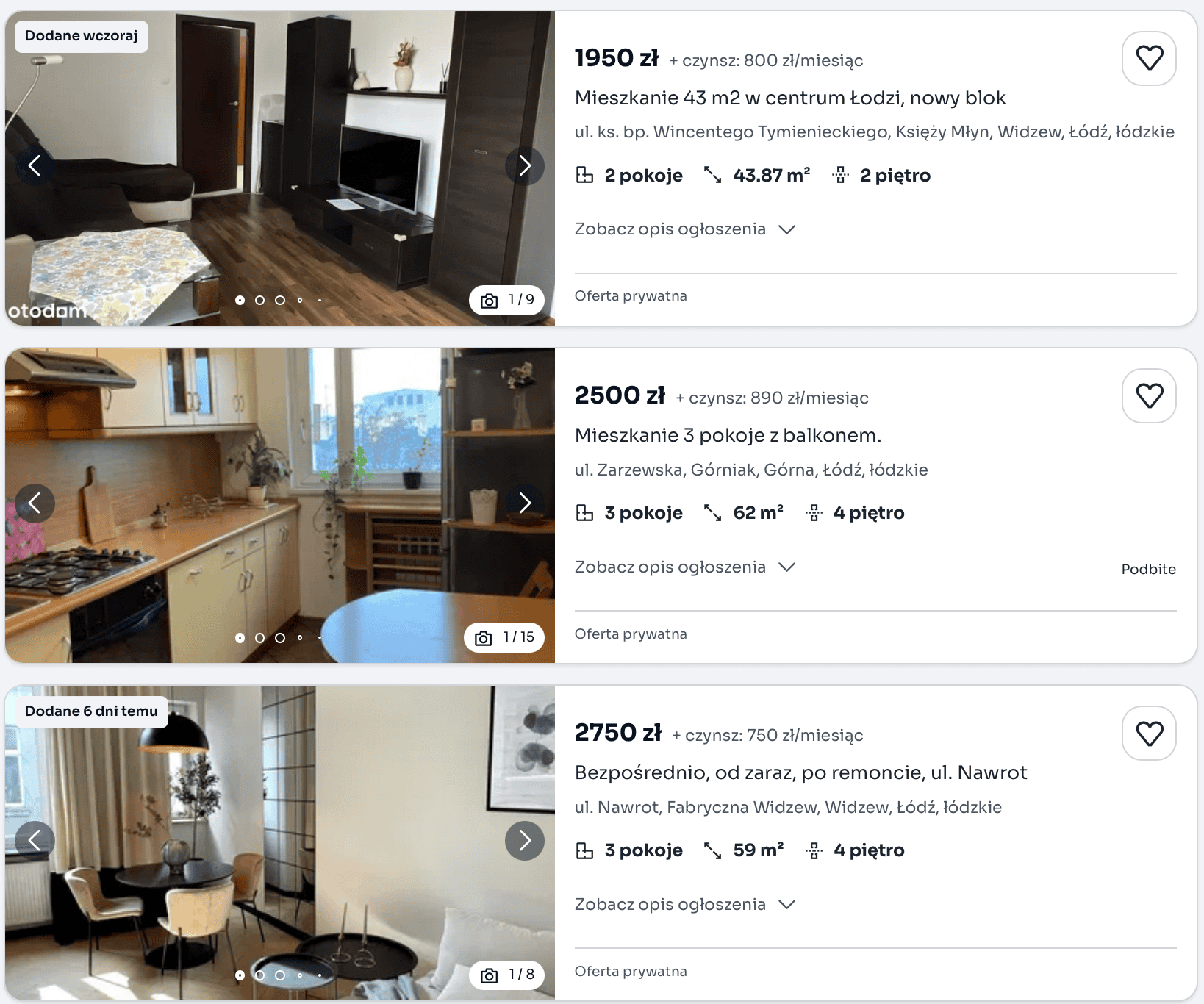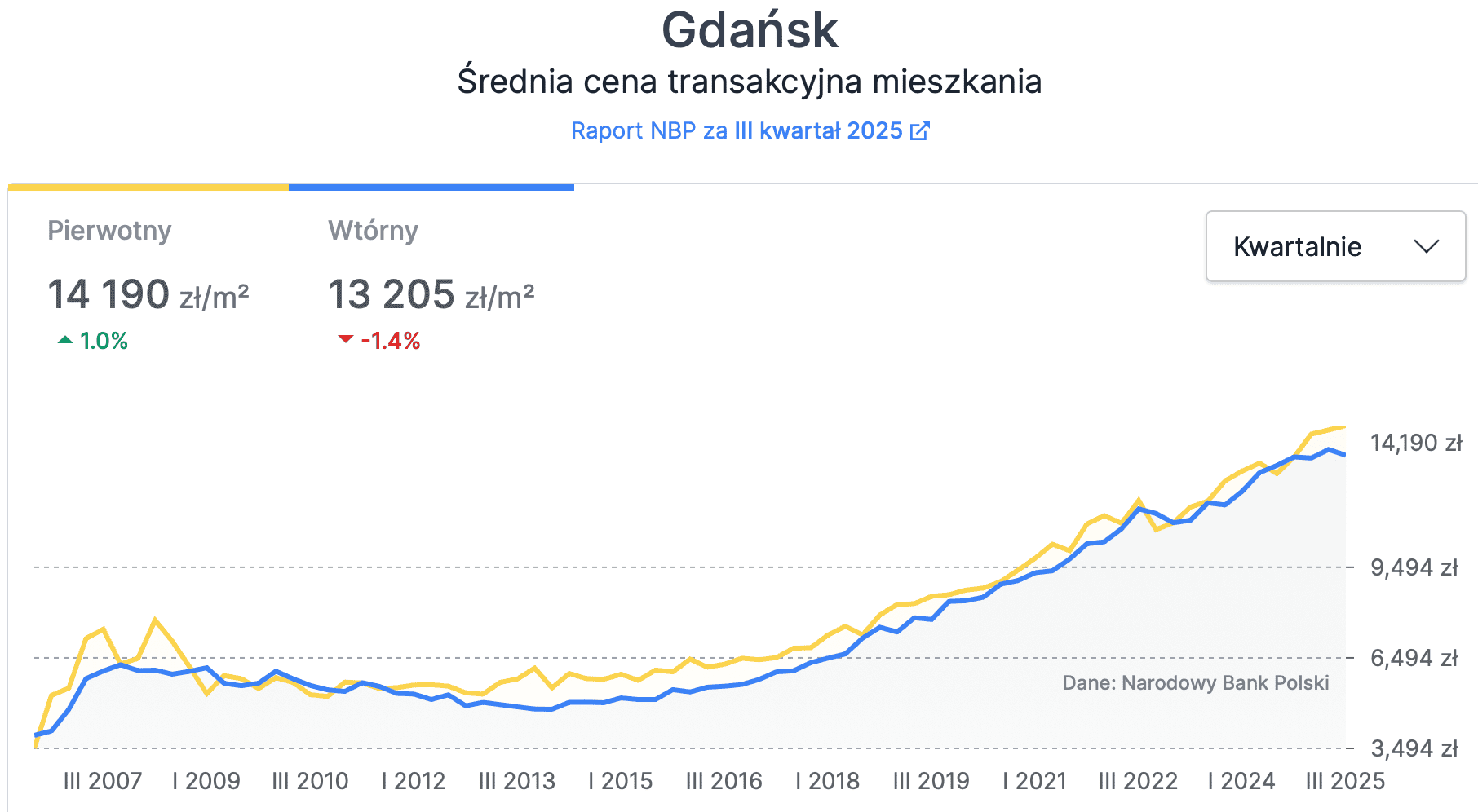Having considered what is cheap in Poland in another post, I’d like to provide my top five nominations for what is expensive in Poland.
Of course, ‘expensiveness’ and ‘cheapness’ are relative terms depending on one’s salary, level of disposable income and experience of prices and the cost of living in other countries.
Apart from Poland, I have lived in Bosnia, Serbia and the UK. I have always maintained that Poland offers a very affordable cost of living compared with Serbia and the UK.
Nevertheless, there are some things which I find to be quite expensive in Poland, as I will now explain:
1. Monthly communal charges
In my post on communal fees in Poland, I wrote about the extortionate extent to which community fees have risen in recent years. Indeed, I told the story of the flat I owned in Gdańsk between 2019 and 2025. Essentially, by the time I sold the flat in January 2025, my communal fees had risen by over 110% in the years I owned the property. For a 75 m2 flat, two parking spaces in an underground garage and a storage unit, the monthly communal charge for March 2025 came to 1,144 zł.
Of course, not everyone can afford to live in such a large flat in Gdańsk and possess two parking spaces. However, let’s put that communal charge into perspective. As of January 1, 2025, the minimum monthly gross salary in Poland is 4,666 zł. This comes to 3,511 zł net. Therefore, the communal charge for my previous flat in Gdańsk is almost one third of the minimum net salary in Poland. It’s quite astonishing really.
Looking at apartments currently for rent in Łódź on the Polish property portal, Otodom, I’m quite shocked by the cost of communal charges. Just at random, take a look at the communal charges below for rather average-sized flats (43, 59 and 62 m2):

As you can see, the communal fees for these flats are unbelievable. The first flat (800 zł service charge) is rather small while the second flat (890 zł) service charge) is an old building in a very sketchy part of Łódź. I’m beginning to think that I’m underpaying for my 66 m2 apartment. I pay 950 zł a month for an apartment in a gated community. The complex was constructed in 2011.
2. Buying an apartment in Poland
I regularly update a post which details the average living cost in Poland. Just recently, I highlighted how the price of an apartment per square metre has skyrocketed in Gdańsk in recent years. Indeed, I paid around 9,700 zł per square metre for my apartment back in 2019. In January 2025, I sold it for 13,000 zł per square metre. Perhaps I could have held out for more money. Nevertheless, the flat required a significant renovation. Moreover, I had received very few serious offers in the long period of time I’d been trying to sell the flat.
The graphic below reveals the average transaction price of apartments in Gdańsk in the third quarter of 2025 compared with transaction prices in previous years:

Now that we’re approaching the end of 2025, it’s safe to say that it’d be tough to buy a well-maintained apartment in a new-build or building constructed in the last five years in Gdańsk for less than 13,500 zł per square metre, or a little over 3,000 EUR.
As for Warsaw, the average transaction price of apartments in the third quarter of 2025 was 16,294 zł on the primary market and 16,05 zł on the secondary market. Hence, we’re in 4,000 EUR territory per square metre. However, there was quite a big difference between the average asking price on the secondary market (18,335 zł) and the aforementioned average transaction price. Therefore, there seems to be substantial room for negotiation in Warsaw. Looking at the number of listings on Otodom, it’s safe to say that the housing market is oversupplied in major Polish cities, such as Kraków, Gdańsk and Warsaw. This suggests that there may be reasonable scope to negotiate the price of your dream apartment.
According to zametr.pl, the average transaction price on the secondary market in Poznań was 11,405 zł in the third quarter of 2025. It’s expensive but it’s much less than the average price in Gdańsk, Kraków and Warsaw. Poznań is also a gem of a city.
3. Long-term apartment rental in Poland
Next on my list for what is expensive in Poland is long-term apartment rental.
I’m currently renting out a 42 m2 two-room flat on the Słoneczna Morena housing estate in Gdańsk for 2,950 zł (695 EUR) a month. This fee includes a parking space in the garage hall under the building. My current tenants have been living in the flat since August 1, 2025. When you add the communal fee of around 550 zł to that rent, it’s easy to read into how high the cost of living is becoming in major Polish cities.
For a one-bedroom flat in a new-build in the city centre district of Warsaw, expect to pay rents of upwards of 3,500 zł a month.
4. Drinking coffee in a cafe
Drinking coffee in a coffee shop in Poland is not just expensive – it’s an absolutely outrageous rip-off. I have a bee in my bonnet about this topic because drinking a good cappuccino in a decent café is actually one of my top pastimes. Unfortunately, I can’t afford to drink coffee in cafés as much as I perhaps did in my early years in Gdańsk (2020-2022) when a cappuccino cost 9 zł in Sowa Patisserie (Cukiernia Sowa).
As of December 2025, you’d be hard pressed to find a small cappuccino in a Polish cafe for less than 15 zł, around 3.50 EUR. As for those cafes which offer ‘large’ cappuccinos, you may have to fork out around 17-19 zł (around 4.25 EUR).
I’m not a vegan but I used to request soya, oat or almond milk with my cappuccino. This is because drinking coffee with regular milk tends to make me eructate. Adding any such kind of alternative milk will also set you back 2-3 zł in most coffee shops. I now go with lactose-free milk which does not incur an extra charge in the coffee shops I tend to frequent.
Grand Café in Łódź
Now that I live in Łódź, I often visit the Grand Café, which belongs to the Grand Hotel, on Piotrkowska Street. Coffee prices there are similar to prices in any other coffee shop in the centre of Łódź and other major Polish cities. However, at the beginning of April 2025, the Grand Café did the dirty on customers by increasing the price of a cappuccino by 1 źl and non-dairy milk alternatives by 1 zł. Therefore, the price of a cappuccino with non-dairy milk went up to 19 zł – 16 zł for the coffee and 3 zł for a vegan milk alternative. It’s crazy really. If I went there twice a week (or eight times a month) with my wife, who also prefers non-dairy milk, I’d have to fork out 304 zł (71 EUR) a month to drink coffee. I simply can’t afford to do that. Overall, I can just about accept the price of coffee. However, cafes that rip off people who prefer non-dairy milk alternatives should be fined. As I mentioned earlier, the lactose-free milk now does the trick for me.
5. Social insurance contributions for those who are self-employed
In early 2025, I wrote a post about my experience teaching English in Poland. It was then that I decided to move away from unregistered business activity in Poland in order to set up a sole proprietorship and become a self-employed English language teacher.
When it comes to running a sole proprietorship for the first time in Poland, it’s not all doom and gloom for entrepreneurs. Sole proprietors can capitalize on Start-Up Relief known as Ulga na start. This relief spares entrepreneurs from paying social insurance contributions (“ZUS”) for a period of six months. Although entrepreneurs are obliged to register for health insurance and pay a monthly health insurance contribution, which also covers family members, they don’t have to pay social insurance contributions related to retirement, disability and accident insurance.
During the first six months of running a sole proprietorship, my declared income was a little lower than the minimum monthly wage in Poland (4,666 zł). Therefore, the amount of the health insurance I had to pay was 9% of 75% of the minimum wage, which is 314,96 zł. The contribution year runs from February 1 to 31 January the following year. Therefore, I will most likely pay the same health insurance contribution until January 2026.
For now, I can live with paying 314,96 zł a month to cover my and my wife’s health insurance. However, what will happen after the Start-Up Relief period of six months elapses? Well, sole proprietors can take advantage of the possibility of paying reduced social insurance contributions (preferencyjne składki ZUS) for another 24 months. In 2025, social insurance contributions amount to 442,90 zł from the seventh month of running a sole proprietorship. The sickness contribution (składka chorobowa – 34,30 zł) is optional so an entrepreneur’s social insurance contributions may be as low as 408,60 zł.
Frankly, I shudder at the thought of having to pay needless social insurance contributions, especially because I don’t want to save into a Polish state pension at all. I just need health insurance for my wife and me.
Poland is still the place to be
I’ve provided my top five nominations for what is expensive in Poland. However, I still believe that educated and well-qualified expats can find very good jobs in Poland and rise above the increasing cost of living in the country. Besides, there are so many things in Poland that are ‘cheap’ in comparison with prices in western Europe.

